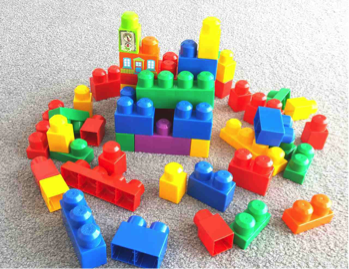By Emily LeRoux-Rutledge.
My children are new in Germany like those two flowers. I want my children to be allowed to stay in Germany…. We build something up. We are like LEGO, block by block.


These photographs and words belong to Liam* — a young man who made his way to Germany in the midst of the so-called European refugee crisis in 2015. They convey his determination to begin anew. Yet voices like Liam’s were scarcely heard during the crisis, subsumed by the voices of those already living in European host societies and their concerns about ‘integration’, which culminated in the 2016 German Integration Act.
In 2017, cognisant of this imbalance, Carmen Lienen and I undertook a photovoice project with refugees and asylum seekers in Germany, who had entered the country since the start of the crisis. We wanted to understand how they felt about the country (in contrast to how the country felt about them) and what would help to foster a sense of belonging. Our results were recently published in the Journal of Immigrant & Refugee Studies.
Much of what we learned aligns with the prevailing literature on immigrant identity, which suggests that newcomers undergo a complex process of identity negotiation as they endeavour to balance their pre-existing identities with those that align with their host societies. Often they do this aware of negative social representations about them, from which they seek to distance themselves. Additionally, they do this in the context of temporal uncertainty brought about by government policies, which require them to wait for approval to remain, to work and to reside permanently.
There was one thing that surprised us, however. Imagine, for a moment, you were to speak with two different groups of people: one made up of refugees with permission to remain in Germany, and the other made up of asylum seekers with no permission to remain. Which group do you think would feel a greater sense of belonging? You might think the former — indeed, previous scholarship has highlighted the importance of secure legal status for integration (which we don’t dispute) — but that’s not what we found.
In our small, qualitative study of the experiences of refugees and asylum seekers in two German towns, we found that those in town N, where the majority did not have permission to remain, felt a much greater sense of belonging than those in town E, where the majority did.
‘I think… I’ve become a citizen of Germany. I feel good,’ said Sabir, a young man in town N who did not have a residence permit.
‘Germany has many job opportunities, future… but it’s not our country,’ said Amer, a young man in town E, who did have a residence permit.
How to account for this? The answer, according to our data, appears to be in the reception of the townspeople:
‘I know almost five to six [local] families where I always go to eat, or who help me with things,’ said Zeynep from town N.
‘Yesterday, I sit at train station and a man asks, “Why do you look at me?”’ [imitates an angry voice], said Rayhan from town E.
The inclusive and open way in which research participants were welcomed in town N seemed to provide them with social scaffolding, underpinned by positive social representations of refugees held by the townspeople of N. This appeared to foster a sense of belonging in our research participants, and, consequently, some of them were able to identify with German culture and claim a German identity.
In contrast, participants residing in town E appeared to lack such social scaffolding and such identification. Their narratives indicated a greater sense of alienation from locals and German society. Few participants reported having personal relationships with locals, which they attributed to Germans being ‘generally private’.
This may, on one level, seem obvious — the way in which people are received impacts their sense of belonging. Yet, under Germany’s 2016 Integration Act — which contains punitive measures against refugees and asylum seekers who have not demonstrably tried to ‘integrate’ — residents of Germany have ‘keinen zusätzlichen Erfüllungsaufwand,’ or ‘no further obligations’.
The German government itself has defined integration as ‘feeling part of a community and developing a common understanding of how to live together in society.’ By explicitly stating in the law, however, that German residents have ‘no obligations’ towards achieving integration, is the government not absolving German residents of the very thing that could foster, in newcomers, the sense of belonging it seeks?
The on-going development of the National Action Plan for Integration may be a step in the right direction. The plan considers how Germany’s institutions and citizens can contribute to sustainable integration — but it remains to be seen how far this goes towards fundamentally shifting people’s understandings of what integration is: a reciprocal process undertaken by both receiving society members and newcomers.
*All names are pseudonyms. The origin countries of participants have been withheld to protect their identities.


Fascinating research about the power and importance of hospitality and community in the refugee resettlement process! The authors have done a wonderful job bringing newcomers’ voices to the forefront to understand their experiences through voices and images. Looking forward to reading more from the authors!